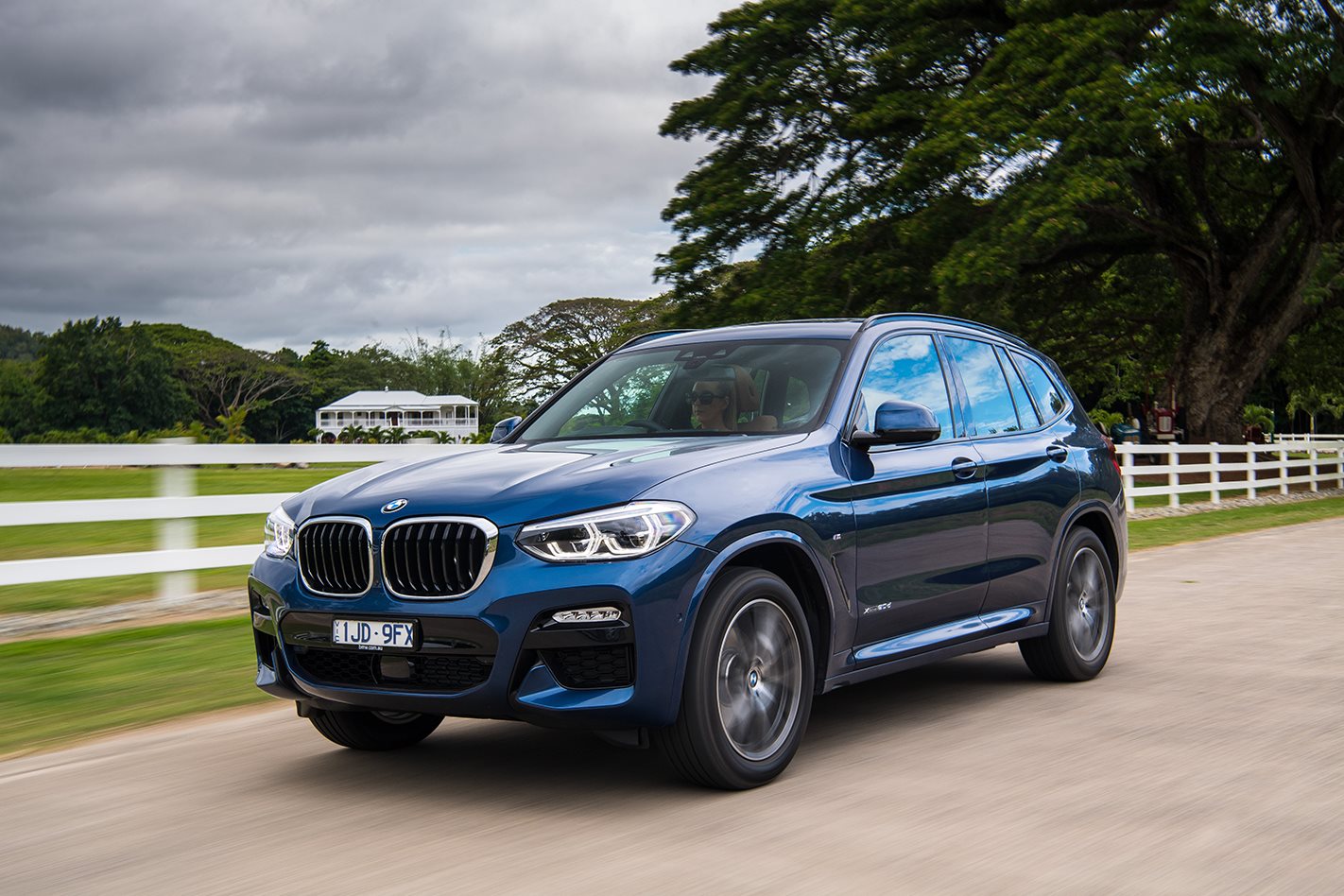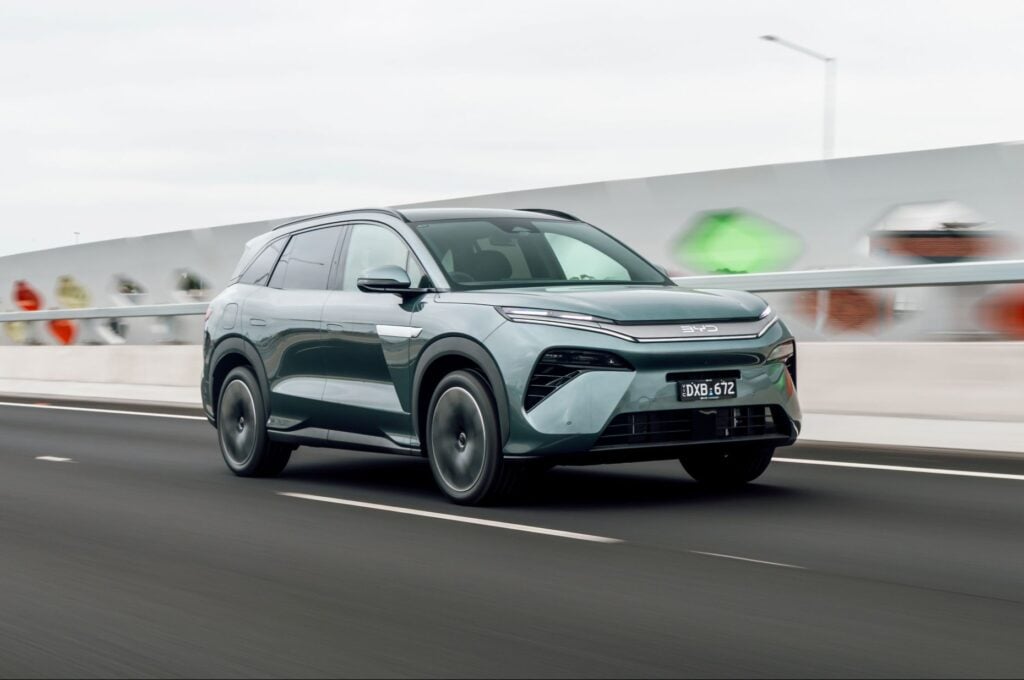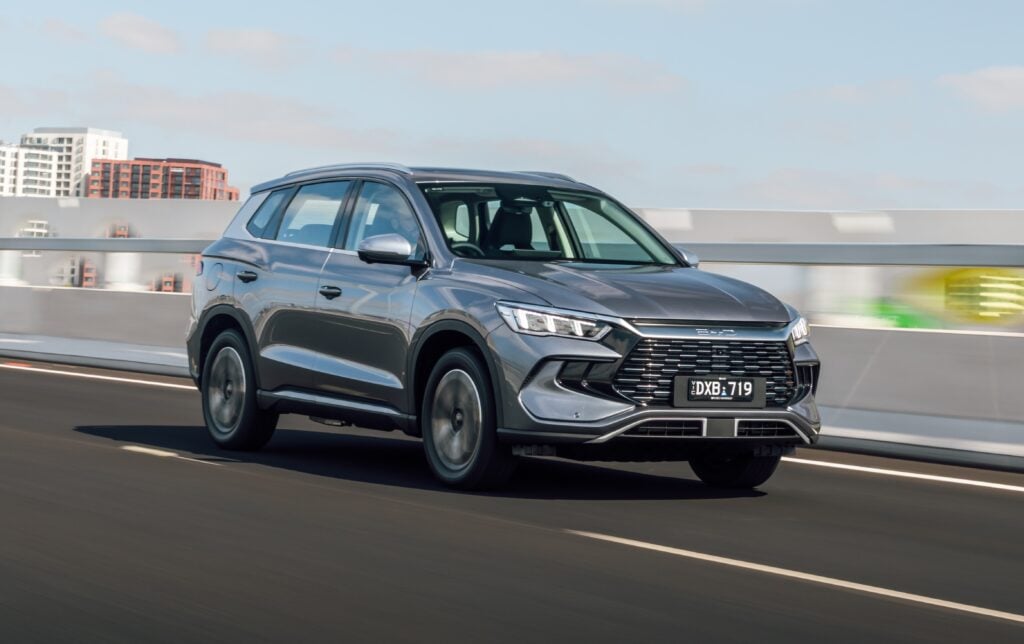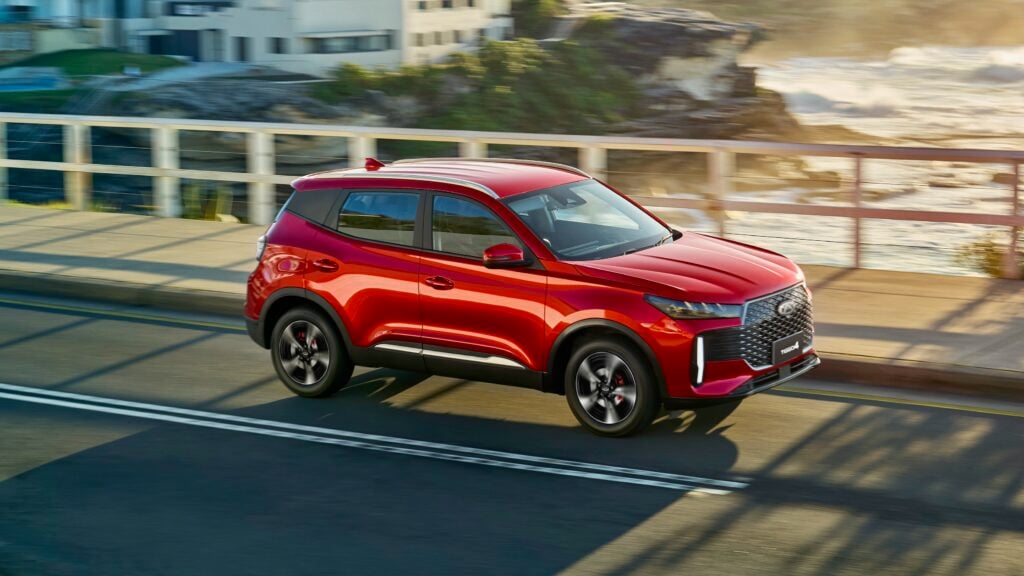
Score breakdown
Things we like
- Interior space and comfort, powertrain refinement and efficiency
Not so much
- Expensive options, wind noise, uninvolved ride and steering
What stands out?
The third=generation BMW X3 is a sporty medium SUV with enthusiastic, fuel-efficient diesel and petrol engines, a slick eight-speed automatic gearbox, and all-wheel drive. Its five-seat cabin offers generous passenger and cargo space, and its attractive exterior was penned by Aussie-born automotive designer Calvin Luk.
What might bug me?
Hanging on to stop you sliding sideways when negotiating sharp bends. The X3’s seats are quite flat with not enough leg bolstering to keep you in place.Having the ambience shattered by wind noise around the large door mirrors. And if you have a panoramic roof you won’t want to open it because of the irritating wind buffering even at lower speeds.
What body styles are there?
Five-door, five-seat SUV-style wagon only. The BMW X3 drives all four wheels, and it is classed as a medium SUV, higher priced.
What features do all BMW X3s have?
Cruise control with speed limiter, and three-zone climate-control, which lets you set different temperatures for each side of the cabin.Infotainment screen, digital radio (DAB+), inbuilt satellite navigation, voice control, six-speaker sound system, and wireless charging pad for compatible mobile phones.BMW ConnectedDrive, with real-time traffic information and Intelligent Emergency Call, which alerts emergency services if you have an accident. Automatic emergency braking, approach control warning (which warns of a pending collision), lane departure warning, and blind-spot warningReversing camera and Parking Assistance, which helps manoeuvre the X3 into a suitable parking spot.Head-up display, which shows speed, satellite navigation and speed-limit information at eye level on the windscreen.Dusk-sensing LED headlights with cornering lights, LED daytime running lights, and rain-sensing automatic windscreen wipersAuto start-stop, which stops the engine while you’re idling to save fuel.Leather multi-function sports steering wheel, and aluminium alloy wheels.Automatic tailgate, and 40:20:40 second-row split rear seats for flexible cargo configurations.The X3 also has seven airbags, and electronic stability control, which can help you control a skidding car. All new cars must have this featureEvery BMW X3 carries a three-year, unlimited kilometre warranty.
Which engine uses least fuel, and why wouldn’t I choose it?
There are currently three engines in the X3 range: two turbocharged diesels and turbocharged petrol. As is common BMW practice, each X3 model is named for the engine that propels it.Both diesels use less fuel than the petrol, and it is the 2.0-litre four-cylinder in the xDrive20d that uses least of all, consuming 5.7 litres/100km on the official test (city and country combined).The main reason you might not choose this effortless diesel is that you would like your X3 to be genuinely quick rather than moderately powerful. The bigger, 3.0-litre, six-cylinder diesel in the more expensive xDrive30d transforms the X3, with about 40 per cent more shove available. Yet is still very economical, using 6.0 litres/100km on the official test.Of the petrol engines, the 2.0-litre four-cylinder in the xDrive30i offers similar performance to the 3.0 diesel, and delivers it more smoothly, while using about 25 percent more fuel (7.6 litres/100km).Another petrol engine will soon join the range in the sDrive20i, which will be the least costly X3 when it arrives early in 2018. It shares its 2.0 litres and four cylinders with the 30i’s engine but it less powerful. It will also be the only X3 with front-wheel-drive, unlike the other models which have all-wheel-drive.At the other end of the scale will be the performance orientated X3 M40i, which will have a powerful 3.0-litre inline six-cylinder turbo engine, which will be capable of sprinting from a standing start to 100km.h in under 5.0 seconds. Fuel economy is yet to be confirmed, but it’s fair to say this won’t be a huge priority for anyone willing to pay more than $100,000 for a fast SUV.Each X3 engine is coupled with an eight-speed conventional (torque converter) automatic gearbox, and features automatic stop-start system, which saves fuel in urban driving. It shuts down the engine when you stop, and starts it again when you take your foot off the brake pedal to drive away.
What key features do I get if I spend more?
The cheapest X3, the sDrive20i (which arrives in March 2018) comes with front-wheel-drive and 2.0-litre petrol engine and has the features common to all X3s. Seats are trimmed in a synthetic material BMW calls Sensatec, and the multimedia system has a 6.5-inch touchscreen display. The wheel diameter is 19 inches.The xDrive 20d is identical to the sDrive20i in terms of features and trim, but adds a gutsier diesel powertrain and ‘xDrive’ all-wheel-drive .Spending more for an xDrive30i or 30d gets you the more powerful petrol or diesel engine, with paddle shifters on the steering wheel for when you want to control gear changes.The interior gains ‘Vernasca’ leather trim on the seats. The multimedia screen is bigger, at 10.25 inches and displays a surround-view monitor, showing a simulated 360 degree view of the car from above (this makes manoeuvres in confined spaces easier). And there is better satellite navigation and you get 20GB hard drive memory to store audio files.Wheels on the more expensive cars are an inch bigger at 20 inches, with lower profile tyres that sharpen the steering a bit.You can enter the X3 xDrive30i and xDrive30d without having to take your keys out of your pocket or handbag. And the tailgate operates hands free by waving your foot under the rear bumper, which is handy when you have your hands full with stuff like shopping bags.Driver assistance is expanded to include adaptive cruise control with a ‘Stop&Go’ function for heavy traffic, lane keeping assist and side collision warning, which senses if a car is coming from either direction.Optional extrasA large number of convenience, luxury, aesthetic and safety options are available at extra cost on all X3s. They include adaptive suspension (which provides a more comfortable ride), and variable steering (which optimises the steering feel for different driving conditions), and alternative wheel designs. Among other options are heaters for the front and rear seats, a premium sound system, and a large power-operated sunroof.There are also option packages which bring a number of features for less than if you added them separately. These include the M-Sport package which includes the adaptive suspension and a number of internal and external enhancements to give the X3 a more sporty appearance. This adds around $4500 to the 20i and 20d price and about $3800 to the 30i and 30d.
Does any upgrade have a down side?
The 20-inch wheels on the X3 xDrive30i and 30d reduce ride smoothness a bit, compared with the 19-inch wheels and tyres worn by an xDrive20i or 20d. The lower profile tyres on the bigger wheels have less rubber and air cushioning you from the road.Of 11 colours available on a BMW X3, only two – black and white – are non-metallic and come at no extra cost. Other colours cost about $1900 extra.
How comfortable is the BMW X3?
The BMW X3’s interior represents a significant improvement over the previous model, in terms of design, materials and ambience.The cabin quality is excellent even before you start ticking option boxes. Buttons and controls are intuitively placed, easy to use and pleasant to touch thanks to their metallic coating.Only the lower plastics, such as the kickpanels and doorbins, look a bit utilitarian; elsewhere the sense of premium is mostly persuasive.It’s roomier than the previous model too, with a 54mm longer wheelbase which actually makes it bigger than the first-generation BMW X5 large SUV. There’s a heap of elbow room up front and the rear seats offer plentiful legroom and a wide enough bench for three adults.The driving position is good, and the instrument panel is neat and clearly presented as is the head-up display. The iDrive multimedia navigation system operates as your intuition expects. X3 cabin feel takes a step up in xDrive30i and 30d versions, thanks to their leather seat trim and extra equipment that includes a bigger, better multimedia screen.The ride in the X3 is taut to the point of being jarring on all but newly laid roads, especially on the 30i and 30d’s bigger 20-inch tyres. The optional adaptive suspension – BMW calls it Dynamic Damper Control – makes a big difference to comfort in the X3. It takes the edge off sharp bumps, and controls and smooths the vertical motion of the body. Paying extra for it brings your X3 ride quality that approaches that of the best alternative premium SUVs.
What about safety in a BMW X3?
Electronic stability control, a reversing camera, and front and rear parking sensors are solid safety fundamentals in all BMW X3s.BMW’s Driving Assistant is now standard in the X3, and includes a camera-based autonomous emergency braking. If it detects an obstacle in front – typically a sharply slowing car – it will warn you and if necessary will initiate braking automatically. There is also a lane-departure warning, which alerts you if you have begun to drift out of your lane (a sign of fatigue), and lane-change warning (otherwise known as blind spot warning), which alerts you to vehicles alongside in a blind spot, via a light on the exterior mirror and a vibration through the steering wheel.The more expensive package, Driving Assistant Plus, is camera-and-radar based, and it works over a longer range and at highway speeds. To the features of Driving Assistant it adds active cruise control, which will maintain a safe distance to vehicles in front, lane keeping assist and side collision warning.The BMW X3 has seven airbags: two directly in front of the driver and passenger; one on the outer side of each front occupant to protect the upper body; driver’s knee airbag, and two airbags on each side to protect the heads and chests of front and outer-rear occupants.The Australasian New Car Assessment Program (ANCAP) awarded the BMW X3 five stars for safety, its maximum, in November 2017.
I like driving – will I enjoy this car?
The BMW X3’s dynamic focus gives it adroit handling and the engines are eager – and in the 30i and 30d, potent. If you can live with the ride comfort compromise that results from the X3’s fixation on sportiness, you’ll enjoy driving it.The happy, effective and economical pairing of each engine and the eight-speed automatic gearbox makes the BMW smooth, agreeable and easy to drive in the city, and effervescent on country roads, where gearchanges are swift.The 30i and 30d have muscle, which is terrific for sporty driving and for effortless overtaking and hill climbing, but the steering feels a little remote.In contrast the least costly X3, the 20i, (due in March 2018) will have enough accessible grunt for easy urban and highway driving, and the power reserves to keep up with most traffic when asked to climb hills. Unlike the other three models it is front-wheel-drive only.The 20d sits in between, offering some of the 30i and 30d’s effortless feel, but not their ultimate oomph, or the high-speed enthusiasm of the 30i.The BMW X3 is an above average off-roader among compact SUVs, with effective all-wheel-drive and a hill-descent control system standard in the 20d, 30i and 30d. Nevertheless, this breed of high-riding wagon won’t get you much further down the beaten track than an all-wheel-drive passenger car.Keen drivers might want to wait until later in 2018, when the BMW M40i arrives, with a 3.0-litre turbocharged 265kW/500Nm straight-six petrol engine under the bonnet. It will be capable of reaching 100km/h from a standing start in 4.8-seconds, thanks to its launch control system, making it quicker than its Audi SQ5 and Mercedes-AMG GLC 43 rivals.The M40i’s will also have sportscar-like handling with Adaptive M Suspension, M Sport exhaust system and brakes, an M Sport differential and 21-inch alloy wheels as standard.
How is life in the rear seats?
The X3’s rear compartment offers good leg, head and elbow room and the bench is wide enough to comfortably seat three adults.Rear seat passengers have their own air-conditioning controls and a 12-volt socket to charge their devices.
How is it for carrying stuff?
The X3 is great for carrying stuff. It has a generous loading aperture that leads to a cargo bay that’s bigger than those of most of the alternatives. It can swallow 550 litres of luggage behind the back seats, which is the same as the previous model.A 40:20:40 split-folding backrest gives the X3 excellent flexibility for carrying rear occupants and large or long luggage items. With all three backrest sections folded the X3’s carrying capacity opens up to 1600 litres.Tie-down points on a pair of runners on the cargo floor provide the means to secure luggage.The powered tailgate, which is standard in the 30i and 30d, becomes very useful with the addition of a contactless opening function, which comes with proximity key entry in the optional Comfort Access pack. It lets you open the tailgate by swiping your foot below the rear bumper, which is handy when you’re loading the car with both hands full.The X3 comes with roof rails that make it easy to attach rooftop luggage devices.
Where does BMW make the X3?
The BMW X3 is built in the United States.
What might I miss that similar cars have?
Not much, if you consider all the extra-cost options. This third-generation X3 has considerable improvements over its predecessor to make the choice more difficult between it and its main rivals, the Audi A5 and Mercedes-Benz GLC.Some cars of about this size offer a third row of seats, for carrying up to seven passengers – notably the Land Rover Discovery Sport among premium alternatives.Perhaps a longer warranty: the Lexus NX SUV is covered for four years, and the less-costly Hyundai Tucson and Kia Sportage for five and seven years respectively.Possibly a petrol-electric hybrid powertrain, for better energy-efficiency around town, which you can have in a Lexus NX and Volvo XC60.Among other cars worth considering are the Jaguar F-Pace, Porsche Macan and Range Rover Velar.
I like this car, but I can’t choose which version. Can you help?
The third-generation BMW X3 arrived at the end of 2017, with three models, the xDrive20d, xDrive30i and xDrive30d. No upgrades are planned, however two new models will be arriving to bookend the range.These include, the two-wheel-drive petrol sDrive20I, which will arrive in March and will be the cheapest X3.The M40i, the first ever BMW X3 to wear a sporty BMW M badge and the most powerful X3 yet, will arrive later in the year and will take its place at the top of the range.
When did BMW update the X3?
The third-generation BMW X3 arrived at the end of 2017, with three models, the xDrive20d, xDrive30i and xDrive30d.No upgrades are planned, however two new models will be arriving to bookend the range. These include, the two-wheel-drive petrol sDrive20i, which will arrive in March and will be the cheapest X3.The X3 M40i, the first ever BMW X3 to wear a sporty BMW M badge and the most powerful X3 yet, will arrive later in the year and will take its place at the top of the range.
Score breakdown
Things we like
- Interior space and comfort, powertrain refinement and efficiency
Not so much
- Expensive options, wind noise, uninvolved ride and steering




